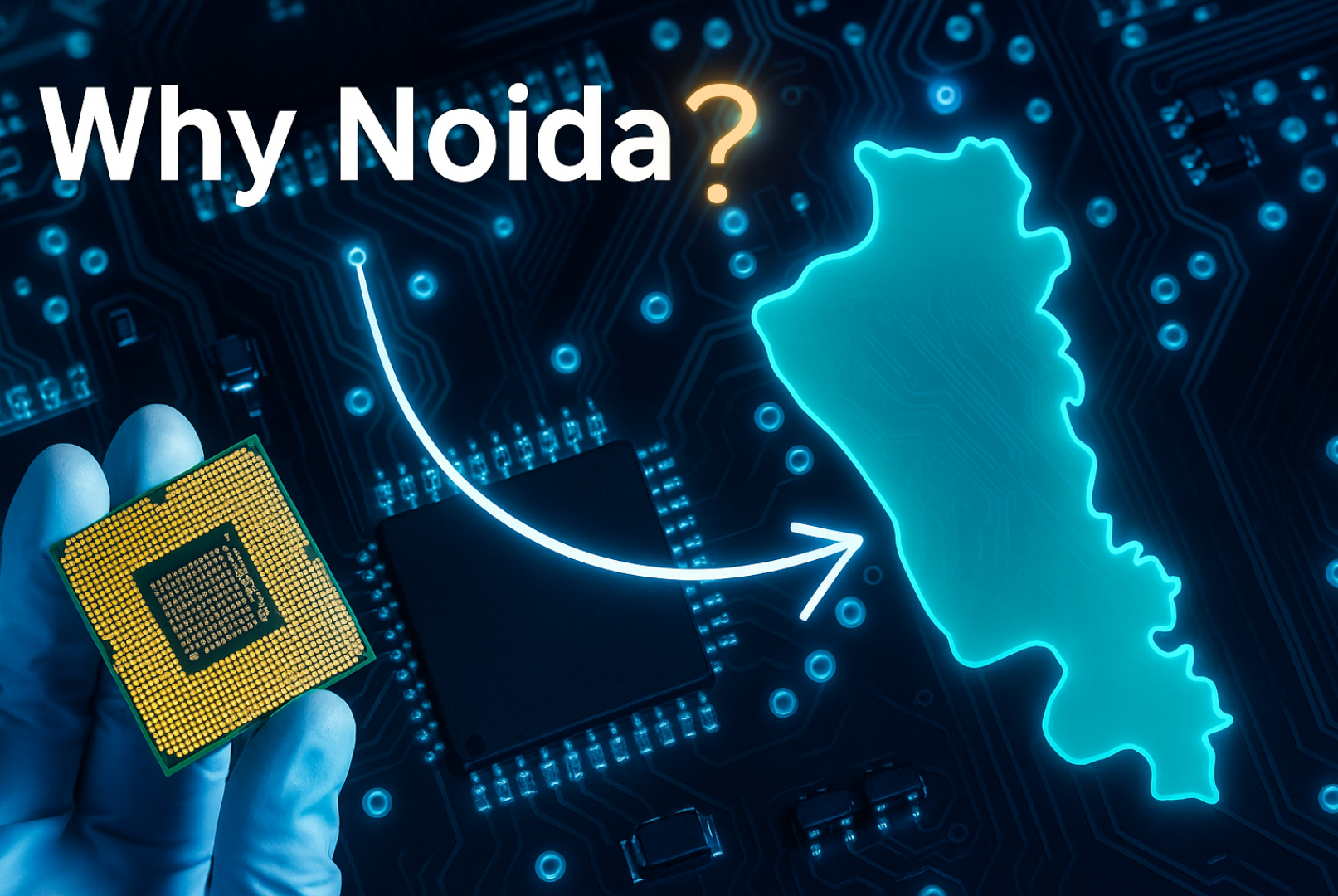Noida, Gautam Budh Nagar is fast emerging as one of India’s most important semiconductor hubs. Recent multi-billion-rupee projects by global and Indian majors have put the region on the chipmaking map, and while official statements often highlight India’s vast engineering talent pool, the decisive factor behind these investments is far more tangible: land and infrastructure readiness.
For investors along the Noida–Greater Noida Expressway, this distinction matters. Semiconductor fabs are long-term, land-intensive projects, and once they arrive, they tend to transform the value of everything around them.
Talent Gets Headlines, Land Seals the Deal
India produces millions of engineers each year, and semiconductor design centers in Bengaluru, Hyderabad, and Noida itself are proof of that strength. Yet when it comes to placing fabrication units (fabs) or OSAT (assembly and test) facilities, companies don’t go where talent is — they go where land, water, power, and logistics are ready at scale.
That is why several recent projects have chosen Noida’s Yamuna Expressway corridor. Large, contiguous land parcels, 24×7 utility availability, proximity to Delhi, and policy incentives have made this zone a frontrunner.
Semiconductor Momentum in Noida
Two major semiconductor projects were approved recently in Noida’s industrial belt:
-
A chip fabrication plant to manufacture integrated circuits for consumer electronics and automobiles.
-
An OSAT facility designed to package and test chips used in smartphones, laptops, and vehicles, with an expected monthly capacity of around 20,000 wafers.
Together, these projects represent investments of over ₹30,000 crore. Beyond their immediate output, they anchor Noida as a serious node in India’s semiconductor roadmap.
The Supplier Ecosystem Follows
Every semiconductor plant pulls in a network of supporting industries — gas and chemical suppliers, logistics providers, component makers, cleanroom contractors, and packaging specialists. Globally, this ecosystem has proven to create hundreds of ancillary units around each fab cluster.
Noida is already positioned for this growth. With its established electronics manufacturing base — more than half of India’s mobile phones are made here — suppliers see immediate customers. For B2B investors, this means that demand for industrial plots along the Expressway will not just come from fabs themselves, but from dozens of associated industries that prefer to be within a few kilometers of anchor clients.
Real Estate Upside: Expressway Sectors in Focus
While job creation is important, the real estate story is even more significant for investors. Once a semiconductor cluster is announced, land values in surrounding sectors rise steadily. Logistics companies, ancillary manufacturers, and even residential demand from high-skilled workers add pressure on available land.
The Noida–Greater Noida Expressway corridor, with sectors such as 136 and 145 is already showing momentum. These sectors benefit from:
-
Direct connectivity to Delhi and the upcoming Jewar International Airport
-
Broad expressway frontage for logistics and industrial transport
-
Availability of freehold industrial plots with wide road layouts
-
Proximity to existing electronics and IT clusters, ensuring business synergies
Analysts note that property prices here remain competitive compared to central NCR, but recent quarters have seen double-digit growth, reflecting rising investor confidence. With semiconductor and airport infrastructure both converging in this zone, long-term appreciation looks inevitable.
Why Noida Stands Out Against Other Cities
Gujarat, Tamil Nadu, and Karnataka have all attracted semiconductor projects, but Noida offers a unique combination:
-
Location advantage: Immediate proximity to Delhi, international connectivity, and access to NCR’s vast consumer and industrial market.
-
Industrial readiness: YEIDA’s large land banks and industrial estates with utilities already in place.
-
Policy support: UP’s semiconductor policy offers capital subsidies, discounted land, and duty waivers, making entry easier.
-
Cluster effect: Electronics manufacturing is already entrenched in Noida, reducing setup risk for chipmakers.
For suppliers and industrial clients, this reduces uncertainty and ensures steady demand.
The Investor Takeaway
For industrial investors, the lesson is clear: when semiconductors come, land values follow. The Noida–Greater Noida Expressway belt offers one of the last major stretches of contiguous, well-connected, and policy-supported industrial land in NCR. With non-polluting industries permitted and demand for supplier ecosystems set to surge, early entry provides the best potential for capital appreciation.
At present, property values remain accessible compared to fully saturated NCR hubs, but this window will narrow as projects break ground and ancillary players move in.
Due Diligence and Plots Available
Industrial clients considering this corridor should focus on:
-
Clear title and freehold ownership
-
Industrial zoning aligned with non-polluting factories
-
Road width and access (40 ft, 60 ft, or 80 ft roads)
-
Utility readiness for power, water, and logistics support
VaEdifice currently offers due diligence–cleared freehold industrial plots along the Noida–Greater Noida Expressway, in sizes ranging from 300 to 1,500 sq. yards. These are suitable for non-polluting industries and benefit directly from the semiconductor-driven growth wave.
📞 For site visits or inquiries, contact VaEdifice at<a href=”tel:+919220594889″>+91 92205 94889</a>

